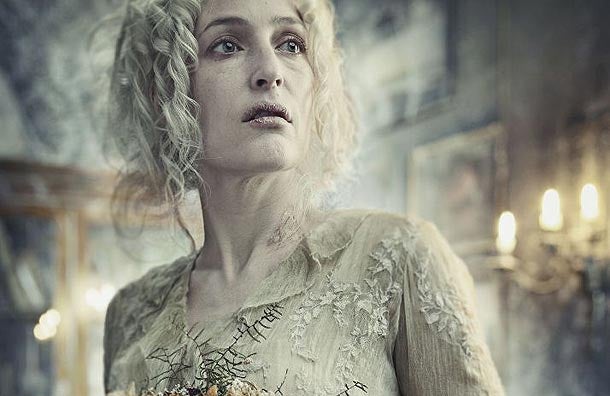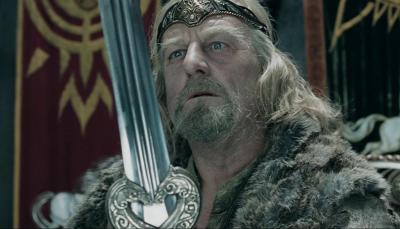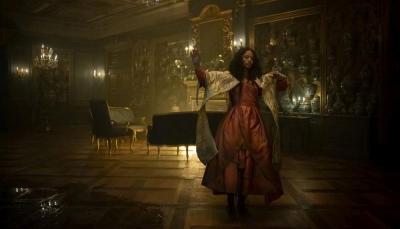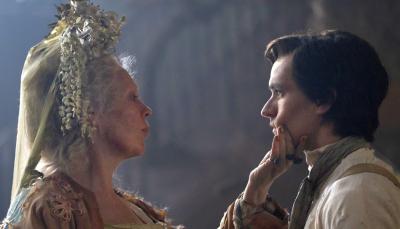Great Expectations, Part One: Episode Dish

Masterpiece Classic is currently airing the BBC’s latest adaptation of Charles Dickens’ classic novel Great Expectations. This version was created to celebrate to mark the bicentennial of Dickens’ birth – another, The Mystery of Edwin Drood, will be airing in a couple of weeks. While I have never been much of a Dickensian, I do have an automatic interest in anything that has this many great actors in it: Gillian Anderson – whom we already know can do Dickens credibly from her turn in Bleak House – Poirot’s David Suchet, Ray Winstone, Vanessa Kirby from The Hour and newcomer (at least to me) Douglas Booth. There was also quite a bit of press around this adaptaion when BBC One aired it at Christmas, thus I have been looking forward to trying it out for myself.
Click through and let’s dish Part One – so far, my feelings are a bit of a mixed bag, but I’m definitely curious about where we’ll go in Part Two this weekend. Would love to hear others’ thoughts!
This is Like a Tim Burton Movie, Sort Of. This adaptation has the all the atmosphere of a Burton production - creepy fog, muted lighting, loads of green filters – but without the dark fun of, say, The Corpse Bride. It’s not just because this film is necessarily sad, per se, though many aspects of it (the wreck of Miss Havisham’s life, Estella’s upbringing and resultant emotional state) certainly carry a heavy air of grief. It’s more that the setting and story are so bleak – the heavy themes of loss, abandonment and manipulation don’t leave a tremendous amount of room for joy and even in the rare moments that characters are allowed to taste happiness, it’s either of the twisted variety or overshadowed by buckets of foreboding that Things Are Not Going To Go Well. It’s still a good story – but it’s understandable that for some people it’s not an easy one to watch. Thus far, I’m enjoying watching Great Expectations, but it’s hard to say that I like it. So, we’ll see how we go.
Embarrassing Signs I Need to Read Dickens More Often. This is especially humiliating to admit, as I was an English major not only once, but twice; yet, apparently I’ve simply forgotten huge chunks of the plot of Great Expectations. My professors would be so ashamed. Around the internet, I’m seeing some people having problems with this production deviating from the book a bit – mostly, it appears, in terms of characterization and depth, but someone out there feel free to educate me if that assumption’s wrong. But, again, just to own my personal shame about this, I can’t at all remember what Joe’s character was like in the book, so it’s hard for me to argue that this is or is not a faithful representation of it. I seem to be spending most of my time trying to remember basic plot points - specifically, the thing that’s bugging me the most, during the early scenes in the bog – who was the man that Pip (wrongly) assumes is Magwitch’s friend? That Magwitch subsequently fights with and almost kills? Who knows who he is, etc? Was he a policeman who was tracking him? Where did he come from? Is he important? Because I have no idea. And that’s actually the only nice part about having apparently deleted (to use a Sherlock word) this novel from my mind is that I can watch it as a viewer mostly on its own merits. (This is also why I never read books again right before I see movies, either!)
Young Pip is a Good Kid, Mostly. Too bad he loses a bit of his attitude from the very beginning as he gets older – but that boy who brings Magwitch a piece of pork pie, simply because he looked hungry, well, you just want to cuddle the stuffing out of him. As our story opens, Pip lives with his sister and her husband the blacksmith and anticipates growing up to a life of working in the forge as Joe does. He’s given hope for a brighter future via an unexpected invitation to visit the reclusive Miss Havisham and her adopted daughter Estella in their crumbling mansion of Satis House. He takes encouragement from both Miss Havisham and Estella’s apparent interest in him but he is greatly disappointed when her plan to underwrite his future only includes payment for him to be an apprentice to his brother-in-law at the forge. Oh, and Miss Havisham also oh so tactfully mentions that he doesn’t need to come by anymore anyway.
One of the most interesting parts of Pip’s early development, for me, is that he seems to be fairly content with himself and his life at the beginning of this story and, as mentioned earlier, is a fairly good person. It’s not until he starts being influenced by Miss Havisham, Estella and his sister’s constant talk of social elevation that he becomes increasingly frustrated and unhappy.
Estella, Meanwhile, is Not. As a young girl, Estella treats Pip horribly – belittling his background, slapping him, gloating over her ability to make him cry – and she shamelessly takes advantage of the fact that he obviously has a crush on her. Most of this these reactions are not really her fault – it’s merely how she’s being trained to behave by her adoptive parent – but it still makes her difficult to really root for her character, because we are not allowed to see too many cracks in her emotional armor. I was exceptionally intrigued by Estella’s response to Pip getting in a fistfight, precisely because it was so excessive for her. “You made something happen,” she says with a laugh and a genuine smile, and a kiss on the cheek. Unfortunately, the moment is so brief and we’re given so little of Estella’s perspective generally, that it’s a bit hard to know what to do with it. What is it about this moment that makes her so giddy? That Pip possesses an agency that she doesn’t? That Estella is bored? That his behavior is something she would like to be able to indulge in herself? (I imagine I’d want to punch Miss Havisham quite a bit, too.) I don’t know, but I’d love to hear theories. That this lack of concern for Estella’s point of view is also largely true of the novel, if I’m remembering correctly, doesn’t make it any less unfortunate. Of our three leads, I tend to find her the most interesting character and, sadly, she’s really the one we “know” the least, at least at this point.
And, Finally…Miss Havisham. Honestly, I struggle what to make out of this particular incarnation of Miss Havisham. Like much else in this production, she is as creepy as anything and is made up of all the idiosyncratic oddities (tattered wedding dress, lack of shoes, cobweb-draped wedding cake, extra-slow voice modulation, clocks that are all stopped) that we expect from this character. I’m intrigued by the decision to cast such a young actress in the role and I think the imagery of Miss Havisham growing old while her house rots around her is very compelling. However, I’m not quite sure how we’re intended to view the character in this particular adaptation – is she completely mad or exceptionally cunning or determinedly vengeful or all of the above? Are we supposed to pity her or be afraid of her or be impressed by her long game of twisted feminist vengeance? Possibly this is exactly what Dickens intended for me to be feeling, and Anderson certainly deserves kudos for managing to convey multitudes of potential meanings through her oddly affected high-pitched voice, but I personally find Miss Havisham more compelling when the character’s a bit more grounded. Or at the very least, consistent.
Estella Would Have Such a Big Psychiatrist Bill Today. Pip’s sudden and unexpected return to the life of a blacksmith appears to be brought about by Estella’s apparent inability to live up to the strange code of behavior set up by Miss Havisham. After witnessing Estella’s reaction to the fight in the courtyard, she insists that the girl is too unruly, too guided by her passions and admonishes her that they will “begin again” now that Pip has been jettisoned from their lives. (Hello, brainwashing much?)
“What is beauty?” “A destroyer.” “What is happiness?” “Deception.” “What is love?” “Death.”
This tiny segment was my favorite scene in the entire first part of Great Expectations and I so wish it had been longer. I wish more of this episode had been like this. It is the first (well, really only) moment that I found truly chilling, and I immediately wanted to know more about what was going on behind the scenes at Satis House between Estella and Miss Havisham. The fact that this entirely deathly creepy segment is brought about by what is, on the surface, a fairly simple and innocent interaction between two children makes everything about a thousand times more horrifying.
Though this does make one wonder, had Estella been a better student at her adopted mother’s knee, what would have happened to Pip?
Enter Mr. Jaggers. As the episode winds down, we jump forward in time a few years. Everyone’s a little older and Pip has grown into a quite startlingly attractive young man. One day, the fantastic David Suchet appears at the forge, playing the fantastically dry and emotionally cold lawyer Jaggers, who is there to break the news to Pip that his dreams are not dead and that he is in fact a young man of (wait for it…) “great expectations.” He’s being sent to London by a mysterious benefactor who has apparently gifted him with a great pile of money, so that he may learn to live like a gentlemen and better his life. Pip, having recently received an invite to call on the Ladies of Satis House, automatically assumes that said benefactor is Miss Havisham and that she means to raise him up to be worthy of Estella. It is glaringly apparent that Pip is destined for disappointment on this front, but oh, well. That’s a story for next week.
This Cast: Doing a Lot with Little. In a lot of ways I think that some of the script decisions of this production are a bit…odd (and I’m less of a Dickens purist than most) and that it is a bit over reliant on atmosphere rather than making the story really pack a punch. It’s a mixed bag this cast is working with, and I have to give them tremendous credit for almost universally doing a fantastic job with the material. Ray Winstone, particularly, terrifies me, far more than this character ever did in the novel and that’s even though I know he’s basically a criminal with a heart of gold. Oscar Kennedy is basically perfect as Young Pip. And David Suchet also turns in some great character work in his brief scenes as Jaggers. Of course, Anderson also deserves kudos for a fabulously complicated performance as Miss Havisham – though, thus far, she is a bit hamstrung by the fact that the script can’t seem to decide what kind of character it wants her to be. I hope we get more of those exceptionally creepy moments like her forcing Estella to recite about beauty and love and death and destruction, because that’s the sort of haunting and terrifying imagery that I remember from the novel.
Well, there’s my ramble. What did everyone else think?




